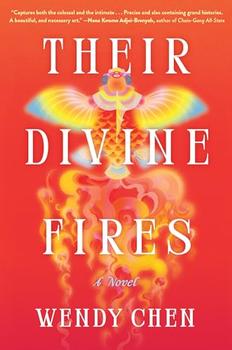Book Club Discussion Questions
Want to participate in our book club? Join BookBrowse and get free books to discuss!
Please be aware that this discussion guide will contain spoilers!
-
Revolutions such as the Chinese Revolution or Cultural Revolution play a major role in the novel. What are the ways in which revolution can bring individuals together or, conversely, tear them apart?
-
Yonghong and Hongxing grow up during the Cultural Revolution (1966–1976) in China, a period of political upheaval and nationalism under Mao. What social or political parallels can you see between the Cultural Revolution and modern-day America?
-
Many of the characters throughout the novel engage with various art forms such as calligraphy, music, dance, painting, and film. What do these art forms reveal about the
characters or their social environments?
-
How does the past affect Emily's life in the present? How does it affect her relationship
with her mother, aunt, and grandmother? In what ways does the historical pastreverberate within your own relationships with your family?
-
During the fifties, sixties, and seventies in China, Mao enacted policies that sent many
urban youths down to the countryside for reeducation. This was part of the effort to
break up Red Guards—most of whom were urban youth—whose political power and
mobilization had become a threat. Families in these urban areas were required to volunteer one of their children—usually the eldest child. Leap Forward, despite being the younger sibling, was chosen to be sent down. How did Leap Forward's family make
such a choice? Can you imagine making a similar choice for your family?
-
What forms of resistance do characters engage with over the most recent century in
China? How have their lives been shaped by these kinds of resistance?
-
During particularly politically fraught times such as the Cultural Revolution or modern-day China, language transforms and new terms emerge. Hongxing, for example, is
"invited to drink tea," a euphemism for being brought in and questioned by authorities. How else does language change with the times throughout the novel?
-
Twins Hongxing and Yonghong are inseparable as children. Later, as they grow up, their lives take them in dramatically different directions. What are the ways in which they grow apart, and how do they come together again?
-
What kinds of fires—metaphorical or literal—are present in the novel? What kinds of fires or passions are present in each of the characters?
-
In what ways throughout the book do children, siblings, parents, and lovers betray one
another? In what ways do they offer each other forgiveness?
-
What secrets do the three siblings Yunhong, Yunli, and Yunjun keep from one another? How are these secrets revealed or kept hidden? How are they wielded or forgiven? What kinds of secrets do you keep from those you love?
-
Names hold great importance in each successive generation in the novel. Names reflect
an individual's place within the family as well as larger social circumstances of the times. The names Yonghong and Hongxing, for example, are a nod to the political importance of the color red during the Cultural Revolution. What other meanings are inherent in the different names that appear in the book?
-
Yunli and Yonghong are both swept up in the respective revolutions of their time: Yunli
in the Chinese Revolution and Yonghong in the Cultural Revolution. In what ways are
they similar in their idealism? In what ways are they different?
-
Throughout the novel, ghosts make several appearances—standing beneath a plum
blossom tree or emerging out of a torn photograph. How do they haunt the characters
who witness them?
-
How do mythologies inform characters' dreams and desires? How do mythologies help
explain the world around them and who they are?
For the full book club kit please refer to the publisher's page.
Unless otherwise stated, this discussion guide is reprinted with the permission of Algonquin Books. Any page references refer to a USA edition of the book, usually the trade paperback version, and may vary in other editions.
